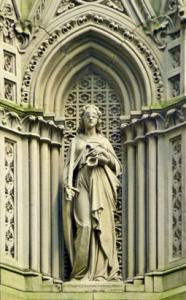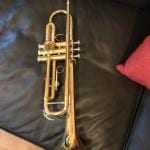 To see correctly, even for a moment, is splendid.
To see correctly, even for a moment, is splendid.
As a child, I was so near-sighted the stained glass in our home church looked like a smear of color. There was beauty, but when I was given glasses I could see more. There was a lamb, a cross, and a crown. The colors remained and if I wished, I could still take off the glasses and see the smear view, but once on I rarely wanted to take my glasses off again.
There might be a person that prefers the near-sighted view. I did at times when “what was there” was less attractive. My room needed painting with glasses on, dirt was obvious. The world around six year old me was harder than the world without glasses.
Yet the lamb, cross, and crown were still there. To see the lamb, I had to stand seeing the cross of a dirtier world, or I would miss the crown: at night time there were jillions of stars, particular lights. There was a supreme beauty in the truth.
Recently, more than one someone began to complain about truth. Truth when found is supreme. A person can deny the truth, even play with alternatives joyfully in fiction, but the truth remains. Suppose I had taken off my glasses, because I preferred the starless sky. The stars keep burning even if I make my own little lights and stare at those to forget the stars. If asked, once I know, I have to say the stars are there.
The truth has a special status if the truth depends on something external to me. God and I are the only authorities on my feelings, but even my experience of the world can be lie. I can fail to experience the stars, or the lamb, cross, crown, but they were shining out to me. Sometimes we can even deceive ourselves, so what we think happened did not. We can, after all, make mistakes even about our own past and so recall events badly. A photograph at Mom and Dad’s has reminded and corrected me.
My felt experience is real as a feeling, yet there is another enduring reality: what happened and so cannot not be. A forgotten experience or even lost feeling can be recollected by a photo or an old recording. I heard a tape from when I was eight and a rush of experiences came back to me. As Socrates showed us: we do not know even ourselves.
A way my teacher discovered my near sightedness was when I could not see what was there. My experience was good, so far as it went, but there was more. Sometimes my vision meant that I was wrong. My mind interpreted marks on the board at the front of the room badly. She helped me see the supreme beauty of truth.
I did resist. “I can see!” If I had the vocabulary at the time, I might have called her a supremacist, eager to impose corrective lenses on me.* If clever, a sophist, I could have adopted a false humility: “I cannot see as well as others, but I accept that this is my seeing. We all see in part.” Fortunately for me, I was only a child and so came to see the supreme beauty of truth.
Some truths are obvious to all, some are obvious to many. Some insights are given to a few. Great ideas are often truly understood by only a tiny group. A person might think, after looking, that Christianity is true. There are other truths to be found in other religions and in non-religious philosophy, but Christianity is most deeply true. You cannot unsee that vision, even if inconvenient, or even dangerous.
You might be wrong, naturally, so do as little harm with your knowledge as you can. The supreme beauty of truth deserves a testimony, at least a “Come and see.”
I took no pride in seeing the lamb, the cross, the crown. The stars are not ours, because we see them. If somehow our glasses, our visions, is distorted and we are wrong, still we create best we can and deny nothing. As much as we can, we allow everything, even our own interpretation of our own experience, to receive a check from the truth.
We testify, however shyly. Sometimes we see and the result is remarkable. One moment all is a blur, the next a lamb, a cross, a crown.
The truth is supreme joy. Christianity is true.
*One should not, of course, force an adult to wear corrective lenses. There might be, if he will not, somethings like driving he cannot do. My doctor told Mom that I should not cross the street without glasses and that may have been wise!











